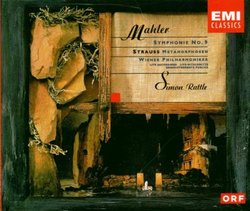A marvel
Rupert Stone | Utopia | 11/29/2001
(5 out of 5 stars)
"Rattle's Ninth is, as ever with his recordings, highly subversive and does things with the score other conductors would wince at. But such is the manner of great artists. This recording is devastating, and relentlessly intense; the first movement is momentous in its death obsessed fury. However, the most striking moments for me are the quiet episodes, where the playing is almost inaudible, mysterious and unsettling. Rarely has a conductor done so much with an orchestra, pushing them to maniacal extremes (the glorious fanfares) or almost silent moments of repose. The middle movements display a perfect sense of architecture; the second, so often misunderstood, is interpreted in all its deranged grotesquerie and ugliness. The third is vast in terms of sound - the moment when the theme from the adagio for trumpet arrives is indescribably sublime and beautifully realised by Rattle. The final movement pretty much defies belief; I have rarely heard as poignant or disturbing an evocation of death and dying in any recording. But that is not all. This set also includes a staggering reading of Strauss'Metamorphosen (which is surely one of the benchmarks for the work). The orchestral playing in both works is of the very highest quality, the Vienna Philharmonic on electrifying form. This piece, the Strauss, is a nightmare to structure, with its circularity and string of death-ridden variations. But Rattle surmounts all obstacles, rounding off the set with an unforgettable rendition that famously stunned the audience in the Musikverein. Along with Karajan's 1982 live version, this is a must have - amazing."
Thought provoking: emotionally draining
Klingsor Tristan | Suffolk | 08/16/2005
(5 out of 5 stars)
"What an endlessly fascinating symphony this is. What it 'means' (if that question has any meaning) is open to question. A huge shout against the injustice of death (Tennstedt perhaps)? A stoical acceptance of the inevitability of death (Walter)? A zen-like acceptance (Solti surprisingly enough)? An impassioned otburst of angst (who else but Bernstein)? And so on.
But musically it is fascinating, too - a real summary of Mahler's symphonic thought and, in that sense, a Ninth to follow Beethoven's example. The exposition of the first movement starkly juxtaposes the elements it will go on to discuss - a halting rhythm, a 4-note phrase that already adumbrates the interval of a second that will be fundamental, a flutter on the violas, a brief horn call, all before the proper main theme, with its drooping seconds, appears. In this respect it is like the Prelude to Parsifal (another late work incidentally) in exposing its musical elements separately before going on to show how they can all transform and combine. At the very end of the symphony, we come full circle in a logically satisfying way as the thematic elements of the final movement disintegrate into the ether, reduced again to just their separate primary constituent elements. We're back to basics again after this huge symphonic journey.
The problem of the nature of central movements is another distillation of all Mahler's symphonic experience. A galumphing Landler (a Mahler favourite) with a profusion of trios. And a bitterly satirical Rondo-Burleske that combines severe fugal and contrapuntal thinking with a visionary trio that looks forward to the finale. (Compare Britten's Cello Symphony for a crib of this.) By the way, how many other examples of musical satire are there? Beckmesser or Strauss's Heldenleben critics seem ridiculously coarse and unsubtle by comparison.
A lot of this thinking was prompted by Rattle's performance with the Vienna Phil. Not that this is an emotionally unengaged performance, all dryly intellectual. Far from it. Rattle and his band, as always in his Mahler, are totally committed - emotionally as much as intellectually. This is a wonderful live performance, intensely moving as the first movement reaches a searing climax which is followed by a deeply troubling funeral march and the gradual splitting apart of the movement's elements. The Landler displays the harsh juxtaposing of bizarrely different sections much loved by Mahler with no apologies from Rattle. The Scherzo is appropriately bitter, admitably clear in its presentation of the fugal elements and thrilling as it rockets off to its uproarious end. The finale is as profound as you could ask. Rattle knows his Mahler inside out. He always retains an ideal control over the structure and argument of each movement and of the symphony as a whole. The climaxes are perfectly proportioned in relation to each other. Dense textures are clarified and elucidated, spare melodic roamings integrated into the whole
It is this unique combination of head and heart that makes this performance so deeply satisfying. I wouldn't be without Barbirolli and the Berliners' devastating performance, groans and all. But now I wouldn't be without Rattle's version as well.
"


 Track Listings (2) - Disc #1
Track Listings (2) - Disc #1